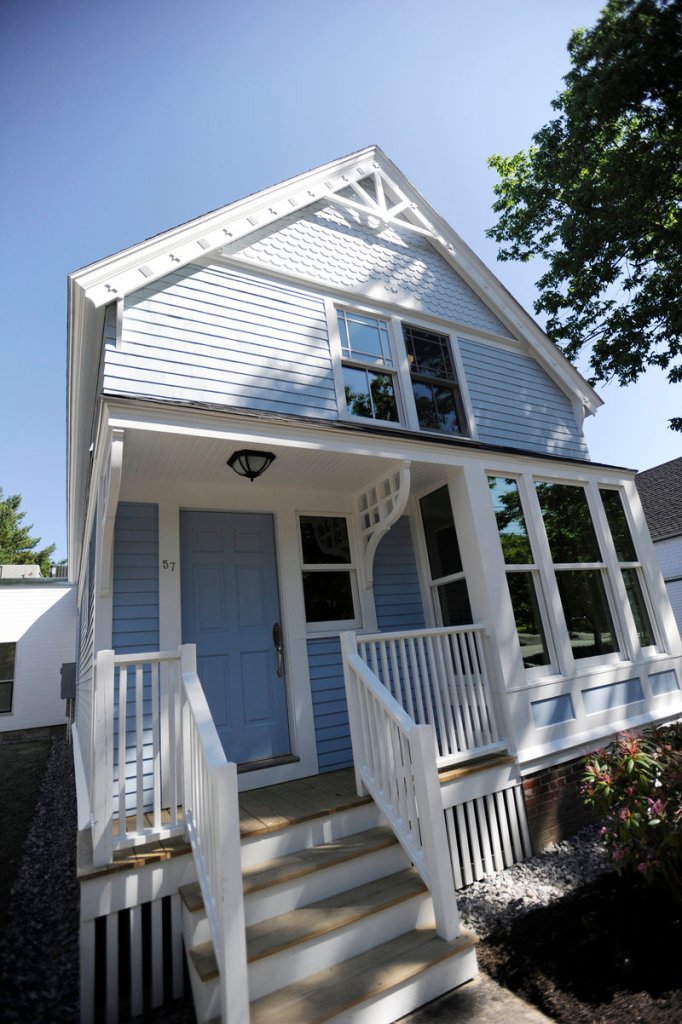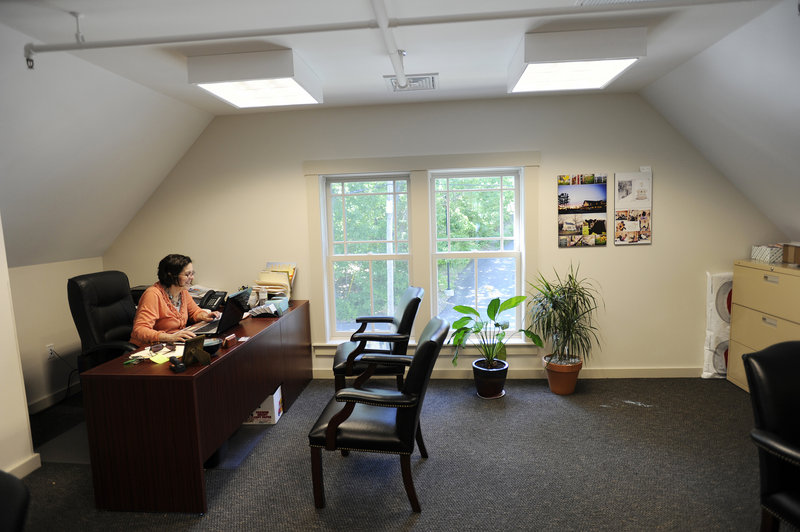FREEPORT – A major energy-saving renovation of the historic Mallett House at 57 Depot St. is complete, and it’s drawing attention from green-building experts across the country.
It’s believed to be the first “deep-energy retrofit” of a historic building in Maine and possibly the nation, combining energy conservation and architectural preservation as few have dared.
Once dilapidated and drafty, the latest addition to the Freeport Community Services complex is so airtight, it literally wowed energy-efficiency professionals when Peter Troast delivered a how-to presentation at a recent national conference.
“They looked at our numbers and said ‘wow,’ ” said Troast, the project’s coordinator. “They couldn’t believe what we have accomplished.”
With every crack filled with foam and multiple layers of insulation added, tests show that air in the 126-year-old house changes 0.68 times per hour, Troast said.
The target for cutting-edge, super energy-efficient new homes is 0.60 air changes per hour. Air in an average home changes three times per hour.
When a building is more airtight, fewer heating and cooling dollars leak outdoors. The retrofit is expected to save as much as $4,645 per year in energy costs, Troast said.
Troast is the founder and CEO of Energy Circle PRO, a marketing firm in South Freeport for energy-efficiency professionals. He volunteered to shepherd the three-year project from development to completion. DeWitt Kimball, a home energy auditor from Brunswick, also volunteered his services.
“Freeport’s way ahead of the curve on this and I wanted to be a part of it,” Kimball said.
Warren Construction Group, also of South Freeport, was the general contractor on the $500,000 project, most of which was funded by grants and donations. Construction started a year ago and included a new wing connecting 57 Depot St. to the rest of the town’s community center.
The retrofit, which is expected to reduce energy costs by 69 percent, cost $31,000, Troast said.
Compared with a typical home built to code, the retrofit is expected to reduce the old house’s annual energy costs from $6,729 for propane and electricity to $2,084 for natural gas and electricity.
That means the cost of energy-saving improvements should be paid off within seven years, Troast said.
The renovation and expansion at 57 Depot St. adds 3,500 square feet of office and storage space to the community center, which connects three of four Mallett houses that remain on Depot Street.
The Mallett houses are classic two-story, wood-frame cottages that were built in 1886 by the businessman E.B. Mallett for workers in his shoe factory, said Scott Hanson, the project’s architectural historian. In 1892, Mallett built 18 additional cottages, which still stand on Dennison, Cottage and Forest streets.
“This project is a nice combination of preserving town history and providing a community center for town residents today and into the future,” said Carol Southall, who has been a Freeport Community Services board member since 1972.
While 57 Depot St. isn’t on the National Register of Historic Places, it has been deemed eligible for the list, Troast said. That’s why such care was taken to preserve architectural details while making the house airtight.
Workers removed clapboard siding and installed 2-inch-thick foam board on three exterior walls and the roof. Then, the original siding was stripped of old paint, reinstalled over the foam board and repainted.
To preserve more significant details on the building’s facade, 6-inch-thick foam board was added to interior front walls. All cracks and uneven surfaces were covered with spray foam, and cavities between wall studs were filled with 6 inches of blown-in cellulose insulation.
Historically accurate replacement windows sacrifice some energy efficiency, Troast said, but a hybrid natural-gas heating, ventilation and air-conditioning system is expected to make up the difference.
Troast plans to monitor energy use and report the results next year.
“We set out to prove you could do both — achieve deep energy reductions and preserve critical historical features,” Troast said. “This is a public demonstration of what can be done.”
Staff Writer Kelley Bouchard can be contacted at 791-6328 or at:
kbouchard@pressherald.com
Send questions/comments to the editors.




Success. Please wait for the page to reload. If the page does not reload within 5 seconds, please refresh the page.
Enter your email and password to access comments.
Hi, to comment on stories you must . This profile is in addition to your subscription and website login.
Already have a commenting profile? .
Invalid username/password.
Please check your email to confirm and complete your registration.
Only subscribers are eligible to post comments. Please subscribe or login first for digital access. Here’s why.
Use the form below to reset your password. When you've submitted your account email, we will send an email with a reset code.